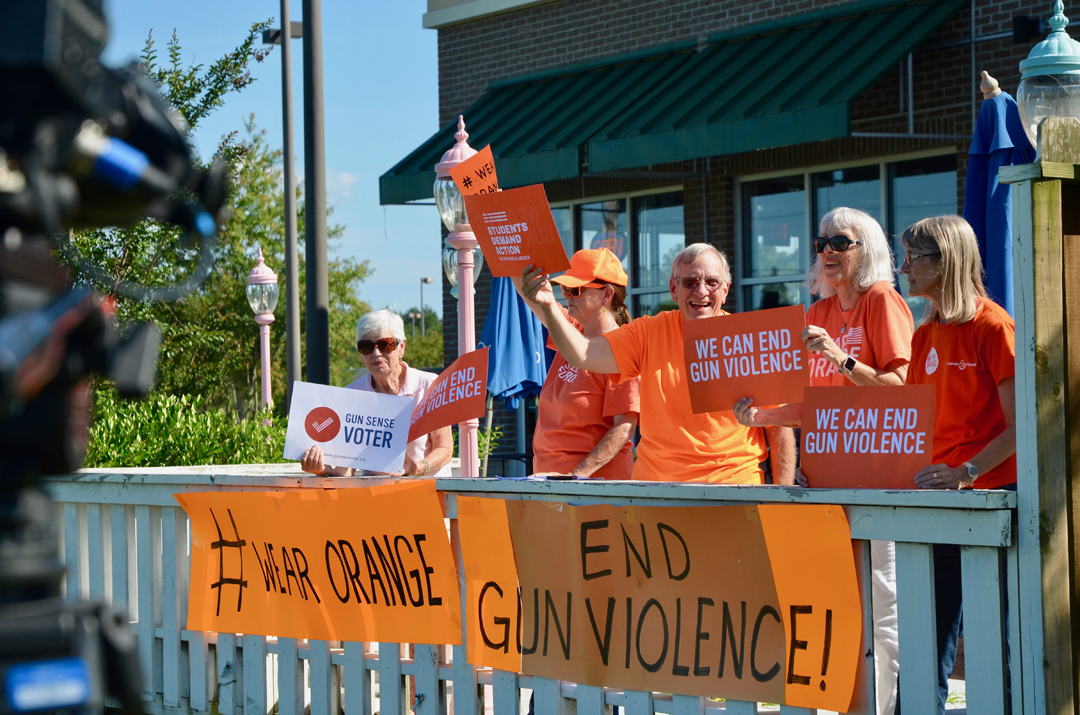Author’s Note: This article’s introduction previously appeared in The Journal of Loss and Trauma on March 18, 2023 in the article “Remembering Mother: Reconstituting Voice and Identity through Narrative with Alzheimer’s Patients” and appears here with the permission of the author, Deborah Cunningham Breede.
“Man, ban, fan…” Mom emphatically points at the man in the Macy’s newspaper flyer. She pokes the page insistently until the newspaper rips. “Wait, Mom, don’t rip it.” I take the paper from her hands and fold it to a different page, opening it so that the glossy color pictures are centered in front of her. “You don’t want to ruin your magazine.” Mom nods and begins slowly and laboriously reading the flyer aloud, “SALE ENDS MONDAY.” “Right, Mom!” I make eye contact with her and smile broadly, “Yes, sale ends Monday.” I am amazed that my mom can still read aloud. She seldom speaks other than the sing song repetitions and unintelligible linguistic jumbles of Alzheimer’s speech aphasia (Williams, Herman, et.al., 2008; Young and Manthorp, 2009). On the rare occasions when she does speak grammatically, it’s as wondrous and haunting as whale song.
My mom was diagnosed with Alzheimer’s disease in June of 2005. She died in August of 2016. She had begun showing symptoms years before her diagnosis. My family in Virginia served as caregivers at first, with me as the alternate for them to have breaks, travel, or have some time to address their own needs. We would take turns bringing Mom down to South Carolina and then taking her back to Virginia, but soon she required care that we were unable to provide. That is when our family made the decision to move her to the Memory Center, a skilled care facility in Virginia Beach, Virginia that originally cost $6,700.00/month for a shared room, meals, and activities. As her condition worsened, doctors recommended a private room, which cost $9,000.00/month, with the same amenities. Her room was furnished, but we provided additional furniture, such as an extra chair for visitors, a television, a music player, and other items that we hoped would improve her quality of life. We also paid for nail care, hair care, and provided all toiletries and clothing. When she died, the obituary cost $800-900.00. The funeral home oversaw most arrangements, including her coffin, funeral, and the cost of her resting place. It totaled $15,000.00-$20,000.00. Luckily, our family was able to afford this. Many families cannot. And none of those costs represent the most important one – our mom, the love of my father’s life, his wife of over fifty years, my nephews’ grandmother, a lifetime of friends and loved ones – well, we all desperately miss her too. We always will.
My family was fortunate in that we were able to unite, pool resources, afford care, and manage Mom’s quality of life in ways that made us all stronger together. Many families in Horry County are not as fortunate and may have minimal resources at their disposal. Deaths of loved ones will occur after long term illnesses that require exorbitant care costs. With the ever-increasing growth in our area, especially of retirees and other senior populations, we must address this concern.
In general, Medicare DOES NOT pay for long-term nursing home care. Medicare Part A may cover some of the skilled care services our loved ones require, but not the cost of food, beverage, or board. Additionally, most care providers require that a “long term” insurance policy be in place prior to admission into their care facility. That means many will have to liquidate family assets, secure a “reverse” mortgage, and/or purchase a life insurance policy to afford such care (Aime & Rhinehart, 2023; American Council on Aging, 2022; Cunningham, 2025).
The Horry County Democratic Party recognizes this need in our area, and seeks our local, state, and federal governments’ assistance with elder care costs and elder related community services. As insurance premiums increase, with many insurers now refusing to provide coverage for various reasons, we must demand that our elders and their families are provided affordable health and nursing care, additional cost of living adjustments for Social Security, Medicare, and/or Medicaid recipients, transportation mechanisms to assist our elders with transportation needs, and medication costs more in line with the global norm than the American norm.
Affordable transportation is another critical issue. Many seniors are unable to drive, and they lack public transportation options. Some areas offer limited bus routes and/or affordable drivers for hire, but most of Horry County lags when it comes to adequate public transportation that our senior population can utilize. Those on a limited income simply cannot afford the increased fees that private transportation services charge. On the other hand, many seniors can drive and travel, and while we have a beautiful, newly renovated international airport, it offers few direct flights and often not enough flights in general to accommodate our quickly growing population. Flights to high demand areas require two or more separate connections, often with challenging schedules that quickly sell out.
What can you do? Well, we are glad you asked! The Horry County Democratic Party is an active group that likes to keep our elected officials informed and accountable. We invite you to join us – to add your voice and energy towards improving our local area. Our calendar, located here, https://horrydemocrats.org/events-calendar/, contains listings of events, many of which are attended by local officials. It is also a wonderful way to meet other like-minded folks in the region. In addition, we have multiple volunteer opportunities listed on our website under this tab, https://horrydemocrats.org/get-involved/volunteer/. Our South Carolina senators, Lindsey Graham and Tim Scott, always welcome hearing from constituents, and both can be helpful in addressing challenges providing elder care. Senator Graham can be reached at his Pee Dee number at (843) 669-1505 or at his Low Country number at (843)849-3887. Senator Scott can be reached at his Midlands number at (803)771-6112 or his Low Country number at (843)727-4525.
Perhaps you have the time or funds to donate to a local elder care, nursing home, or “Place for Mom.” When I visited my mom, I would bring music to sing songs and dance. I brought books and magazines to read aloud. I would bring my dog, Wiley, to visit with the residents, who LOVED seeing and petting him. I would wheel my Mom and other residents around the gardens, and we would go “visit” other wings of the facility, making new friends everywhere we went. Of course, by this time my mother was completely nonverbal and had to be propped up to sit, but sometimes she would smile, or hum along. Every little moment was a joy. Take advantage of this joy while you can. It will all end too quickly, no matter how long you have.
References
- Aime, M. & Rhinehart, C. (2023). “Nursing Homes: Cost of Care.” Downloaded on 1/20/25.
- American Council on Aging. (2022). “Medicaid Eligibility.” Genworth Cost of Care Survey Downloaded on 1/20/25.
- Breede, D. C. (2013). Remembering Mother: Reconstituting voice and identity through narrative with Alzheimer’s patients. (2013). The Journal of Loss and Trauma 18.5, 461-171.
- Cunningham, E. (2025). Personal interviews conducted by author, January 7-9, 2025.
- Small, J. A., Geldart, K., & Gutman, G. (2000). Communication between individuals with dementia and their caregivers during activities of daily living. American Journal of Alzheimer’s Disease and Other Dementias, 15, 291-302.
- Williams, K. N., Herman R., Gajewski, B. & Wilson, K. (2008). Elderspeak communication: Impact on Dementia care. American Journal of Alzheimer’s Disease and Other Dementias, 24, 11-20.
- Young, T. & Manthorp, C. (2009). Toward a code of practice for effective communication with people with dementing illnesses. Journal of Language and Society, 28, 17.






